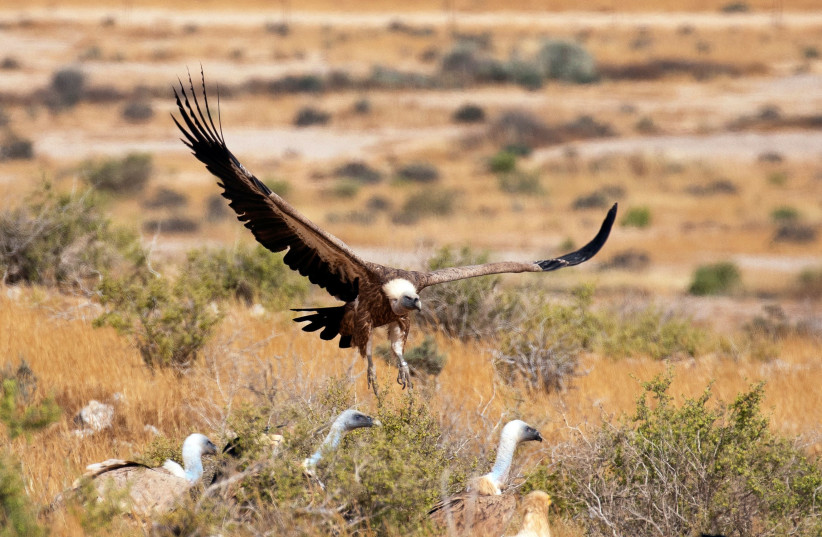At least nine vultures were poisoned and killed in a deadly and seemingly intentional attack in the south of Israel on Sunday afternoon, the Nature and Parks Authority reported.
The birds were discovered in the south of the country, near Nahal Kina and Nahal Kamir, after information regarding the poisoning was received by the Nature and Parks Authority via chips that had been placed on the vultures.
Upon receiving the data transmitted by the chips, Nature and Park Authority inspectors traveled to the area and discovered the nine vulture carcasses, along with the remains of a goat, which is suspected to have been the source of the poisoning.
Both the goat and the birds will be taken to a veterinary institute in Beit Dagan for further inspection, and inspectors are scanning the area for further information and evidence, along with a poison detection dog. An investigation into the incident has been opened by the Nature and Parks Authority, at the end of which, a complaint will be filed with the police.
On the chance that there is poisoned meat still in the area, feeding stations have been set up close by in order to prevent additional birds from ingesting the poison.

"This is a very serious and difficult event which significantly harms the vulture population in the south," said a spokesperson for the Nature and Parks Authority.
Responding to the incident, the Society for the Protection of Nature in Israel (SPNI) highlighted the extent to which the poison attack has damaged the vulture population.
"Today there are around 200 vultures in Israel. Nine vultures account for almost 5% of the entire population in the country," the organization stated.
"The poisoning of vultures continues, and each time we are shocked anew," the statement continued. "Until the law is changed it will be very difficult to catch the perpetrators, and even if they are caught, it is doubtful whether they will be prosecuted."
In November 2020, a report published by the Environmental Protection Ministry stated that "malicious poisoning incidents are the biggest and most crucial threat to the existence of vultures in our country. Of the 213 vultures injured between 2001-2015, about 40% were affected by poisoning incidents. Seventy-four deaths from unknown causes must also be added to this, as it is estimated they were caused by poison."
It is not just vultures that are affected every year by intentional poisoning, however. In July of this year, an estimated 20 wild animals, including an endangered white-tailed eagle, were killed through the deliberate use of an illegal pesticide.
A study conducted by the Science Division of the Nature and Parks Authority has shown that on average, there are 120 malicious poisoning attempts each year, causing a death toll in the hundreds. Most of the poisonings are carried out through the use of illegal pesticides, with the perpetrator spreading it on food, causing animals to ingest it.
It is estimated that since the 1950s, the extinction of several species in the region has been directly caused by the use of poisonous pesticides.
